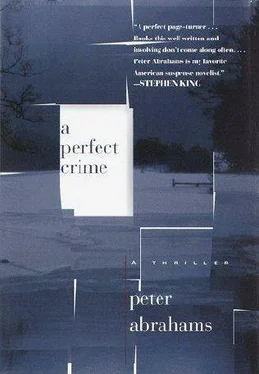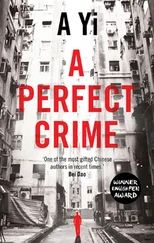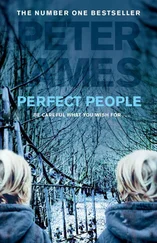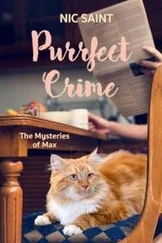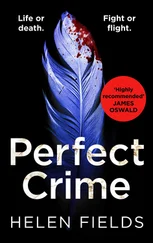Peter Abrahams - A Perfect Crime
Здесь есть возможность читать онлайн «Peter Abrahams - A Perfect Crime» весь текст электронной книги совершенно бесплатно (целиком полную версию без сокращений). В некоторых случаях можно слушать аудио, скачать через торрент в формате fb2 и присутствует краткое содержание. Жанр: Триллер, на английском языке. Описание произведения, (предисловие) а так же отзывы посетителей доступны на портале библиотеки ЛибКат.
- Название:A Perfect Crime
- Автор:
- Жанр:
- Год:неизвестен
- ISBN:нет данных
- Рейтинг книги:4 / 5. Голосов: 1
-
Избранное:Добавить в избранное
- Отзывы:
-
Ваша оценка:
- 80
- 1
- 2
- 3
- 4
- 5
A Perfect Crime: краткое содержание, описание и аннотация
Предлагаем к чтению аннотацию, описание, краткое содержание или предисловие (зависит от того, что написал сам автор книги «A Perfect Crime»). Если вы не нашли необходимую информацию о книге — напишите в комментариях, мы постараемся отыскать её.
A Perfect Crime — читать онлайн бесплатно полную книгу (весь текст) целиком
Ниже представлен текст книги, разбитый по страницам. Система сохранения места последней прочитанной страницы, позволяет с удобством читать онлайн бесплатно книгу «A Perfect Crime», без необходимости каждый раз заново искать на чём Вы остановились. Поставьте закладку, и сможете в любой момент перейти на страницу, на которой закончили чтение.
Интервал:
Закладка:
“You should stay home,” he said. “You don’t look at all well.”
“I’m fine.”
Roger pulled up a chair, watched her sip the coffee. “Working late last night?” he said.
“Yes.”
He nodded. “I hope you’re appreciated,” he said. “Some especially important project, is it?”
“I don’t know what you mean by especially important. The acquisitions committee meets next week-it’s always a busy time.”
“Seen anything you like recently?”
“What do you mean?”
“Objets d’art. What else could I be referring to?”
“Nothing.” But it had been years since he had discussed her work. “I’m recommending a few pieces.”
“Such as?”
“There’s a photographer in Providence. She does old people under streetlights, in black-and-white. Mostly black.”
“Any paintings?”
“No paintings,” Francie said.
Roger dressed warmly: turtleneck, chamois shirt, thick corduroy pants, ski hat, Gore-Tex gloves, his L. L. Bean boots. He went into the garage, opened Francie’s car, looked in the glove box, found a wrinkled envelope with a map drawn on it jammed at the back, as he’d been sure he would-he knew her, and nothing she did could change that. Directions to B. ’s, she’d written in her neat hand. He studied the map for a minute or so, replaced it. Then, putting a shovel in the back of his car, he drove to a hardware store. The clerk made keys from the two patterns. Roger filled his tank and headed west, out of the city. His car had four-wheel drive and good tires, but the sky was low and dark and snow was in the forecast. He switched on his headlights and set the cruise control prudently to fifty-five.
Snow was falling by the time Roger stopped in front of Brenda’s gate-marked wrought-iron g. on the map, as he recalled-falling, but falling hard enough to have obliterated any trace of tread marks? Roger’s eyes followed the track that rose up the hill beyond the gate, white, smooth, unbroken. He had his first moment of doubt.
The gate was padlocked. Roger got out of his car, took out the two keys. The first one worked. He drove through, his wheels spinning slightly as he came to the top of the hill, and cautiously down the other side, foot on the brake the whole way.
He parked by a stone jetty, covered in snow, and looked out at the island in the river. Snow, clean and pure, lay deep on everything: the trees, the roof of the cottage, the river. Roger remembered going out in the Adirondack woods as a boy to cut down a Christmas tree with his father’s man, as they called him, Len; how Len had pretended to chop off his own foot, having brought along a Baggie of ketchup to complete the illusion: red stains in the snow, Len laughing his toothless laugh, a drop of mucus quivering from the tip of his hairy nose. Roger’s father had fired Len that very day for putting such a scare into the boy.
Roger stepped onto the jetty, saw no sign of tracks across the river. Doubt again. Was he seeing ketchup and thinking blood? He gazed down onto two dinghies, filled with snow. It was falling harder now, the flakes bigger. Roger reached into the nearest dinghy, picked up an oar, and jabbed it on the river ice. Solid. He lowered himself onto the river and started across, testing the ice with the oar at every step.
Roger walked onto the island, past the giant elms, also reminding him of his boyhood, up to the front door of the cottage. Snow on the porch, snow on the glider, even a little mound of it clinging to the upper hemisphere of the doorknob. Doubt. He took out the remaining key. It worked. Roger went inside.
He closed the door, took off his boots, took off his gloves. Kitchen: a wine bottle on the table, half full. Roger reached for it, stopped. Flake of dandruff falls off your head, you fry. Strange, how the mind worked. He put on the gloves, drew the cork, tilted the bottle to his lips, not quite touching, and tasted the wine. Still good, although not much of a wine. He stuck the cork back in, left the bottle in the same spot on the table.
Roger opened the refrigerator, empty, and the cupboards: dishes, glasses, the expected. He went into the living room, ran his eyes over the books, mounted the stairs. He glanced into a bedroom with a bare mattress on the bed, moved into the bathroom: bar of soap and a bottle of shampoo in the shower. He picked up the shampoo with his gloved hand. Principessa was the brand, and the writing on the bottle was Italian. A towel hung over the rail; he could see it was dry.
Roger went into the last room, another bedroom, this one made up. He checked the closet: two life jackets and a terry-cloth robe on the rail, something silver glinting on the high shelf at the back. He reached for it, a box, a silvery slippery box that he almost dropped. Lancome face powder: would have been messy. He put it back. Then he knelt, peered under the bed, saw dustballs. He pulled back the duvet, checked under the pillows, stared at the sheets. White sheets, spotless. He bent over the center of the bed until his nose was almost touching the bottom sheet and sniffed. He smelled nothing.
Ketchup, instead of blood. Had he built a huge construction on a foundation of nothing? Then, straightening, Roger saw brown-tipped flowers in a glass vase by the window, dying but not dead. Irises? Yes, but even if they were, what then? Nothing certain. A foundation of very little. If he had made one mistake in his life, in his work, it was letting his brilliance speed him along too quickly. Homo sapiens was a jealous species.
Roger smoothed the duvet, went downstairs. He stood in the kitchen for some time, watching the snow fall. Then he put on his boots and went out, making sure the door was locked behind him.
Roger walked back across the river, poking ahead automatically with the oar, his brain rearranging the few pieces-irises, wine, wet boots, call-in show-and projecting the shapes of missing ones that might not even exist. He almost didn’t notice the bump in all the white smoothness of the river, a protrusion like driftwood covered in snow.
Bending over it, Roger dusted off the snow. Underneath he saw not driftwood but a brown-paper-wrapped package, frozen stiff. He got his hands on it, pulled; the package didn’t budge. Clearing away more snow with the blade of the oar, he saw that the package, tilted at a forty-five-degree angle, was stuck in the ice.
Roger went to his car, returned with the shovel, chipped away carefully. After a few minutes, the package came free. Then he was down on his hands and knees, tearing at the frozen paper.
A painting. One half blurred and damaged, all murky brown and green. But the other half showed a crumbling plinth, a few dangling red grapes, the front wheels of a skateboard.
The wind began to blow at the wrapping paper. Roger scrambled around, gathering it up. He came upon a white envelope, threw off his gloves, ripped it open. Inside a note: To Ned, with all my love, Francie.
Roger stood in the middle of the river, snow falling harder, wind whipping icy flakes at him from different directions. His mind was the same-a turmoil of thoughts, racing by too fast for even him to examine. Must clear, must clear, must clear, he thought, and with great effort he forced his brain to stop, his mind to go blank. He stood panting, his head empty, feeling nothing, not cold, snow, wind.
And into this calm, a meditational calm, although he’d always despised the idea of meditation, came a first brief thought, or rather, memory. A perfect crime: it’s got to be absolutely unconnected-a penny drops off the Empire State Building, goes right through your skull.
8
Roger drove back to the city, still at a prudent fifty-five, but his mind was racing. He was used to the speed of his mind, had known it to run far ahead of him before, but never in this supercharged way. His whole body was shaking slightly, like a shell that could barely contain the forces within. Hold on to one thought, he instructed it, or at most a single train of thought. He settled on one right away, a simple syllogism. Major premise: F tries to make a fool of R. Minor premise: R is not a fool and will not bear it. Conclusion: question mark.
Читать дальшеИнтервал:
Закладка:
Похожие книги на «A Perfect Crime»
Представляем Вашему вниманию похожие книги на «A Perfect Crime» списком для выбора. Мы отобрали схожую по названию и смыслу литературу в надежде предоставить читателям больше вариантов отыскать новые, интересные, ещё непрочитанные произведения.
Обсуждение, отзывы о книге «A Perfect Crime» и просто собственные мнения читателей. Оставьте ваши комментарии, напишите, что Вы думаете о произведении, его смысле или главных героях. Укажите что конкретно понравилось, а что нет, и почему Вы так считаете.
